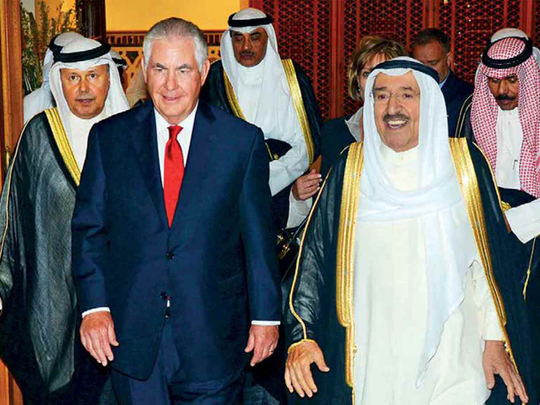
Dubai: Four Arab states sought to pile pressure on Qatar over its support to terror, saying the publication of a previously secret accord between Riyadh and Doha showed Qatar broke a promise not to meddle in the affairs of Gulf countries.
The text of the 2013 accord, whose existence was known but whose contents have never before been made public, was first published by Cable News Network (CNN) on Monday. In a joint statement, Bahrain, Egypt, Saudi Arabia and the UAE said the publication of the accord “confirms beyond any doubt Qatar’s failure to meet its commitments and its full violation of its pledges”.
The document surfaced as US Secretary of State Rex Tillerson arrived in the region to help Washington’s allies hammer out a way out of the crisis.
The revelation of details from the Riyadh Agreement documents by CNN will certainly help people to better appreciate the core of the dispute between Bahrain, Saudi Arabia and the UAE on one side and their fellow Gulf Cooperation Council (GCC) member Qatar on the other, a Bahraini researcher said.
“The facts are all there for everyone to see and appreciate,” Mohammad Jaber said. “They were clearly stated in 2013 and in 2014 and all the countries have agreed on them and confirmed their approval with formal signatures.”
The GCC, set up in 1981, also comprises Oman and Kuwait.
According to the analyst, the formal signature meant serious commitment to the points mentioned in the agreement and there could be no doubts or misinterpretations.
“The agreement was signed in November 2014 and allowed the reinstatement of the three GCC ambassadors who had been withdrawn, and eventually the holding of the GCC summit in the Qatari capital, Doha. Everything was supposed to have been achieved in good faith, although we now realise that either Qatar was then trying to gain some time or something happened after the Qatari Emir, Shaikh Tamim Bin Hamad Al Thani, returned home from Riyadh and caused a change in the Qatari approach to the Gulf consensus.”
Hamad Al Amer, a former Bahraini senior diplomat, said that Qatar’s failure to honour its commitments in the Riyadh Agreement was in line with a tradition that has been going on for more than 20 years.
“Perhaps the most painful truth in the course of the Gulf crisis is that it has been left unresolved for the last 20 years,” he said. “There has been no serious pause to correct the course of the Gulf relations, which allowed Qatar to continue to draw up plots and schemes and to support enemies to harm its fellow GCC states, totally oblivious to the negative impacts on the region and at a later stage on Qatar itself.”
Qatar is betting on the bazaar of mediation, the blurring of texts and the exploitation of the US position that is oscillating between the White House and the State Department, especially since US Secretary of State Rex Tillerson was the Chairman of ExxonMobil Petroleum, which developed the North gasfield in Qatar for two decades before he was appointed to the State Department in February where he is influenced by some of those responsible for implementing the plan of creative chaos in the Arab world during the presidency of Barack Obama, the analyst said.
“Qatar is also relying on its diplomatic campaigns and on using the media at all levels to promote itself and to deny its involvement in, and support for, terrorism.”
Qatari ambassadors have been writing opinion pieces making grand claims about how their country is being bullied by its neighbours for, “in contrast to many regimes in the region, Qatar has championed American values, including constitutional government, freedom of speech and human rights.”
Al Amer said that Qatar was also working on “establishing new security alliances in the region by consolidating its political, military and economic relations with Turkey, and getting closer to Iran, the first sponsor of terrorism and an outlawed and isolated country.”
“This completely contradicts Arab national security and undermines the Gulf security and defence strategy in the Council,” he said.
A history of open, silent clashes
1986: Qatari helicopters seize 29 workers employed by a Dutch firm to build a coastguard station for Bahrain, triggering a dispute that almost degenerates into armed conflict. Then Saudi King Fahd Bin Abdul Aziz steps in to contain the situation.
1991: Qatar takes the case of a border dispute with Bahrain to the International Court of Justice (ICJ). The case is reviewed in 2000 and the verdict is pronounced in 2001. It is the longest case of its kind in the history of ICJ.
1992: Armed clash between Qatar and Saudi Arabia related to the demarcation of borders. Three people are killed.
1996: Qatar accuses Saudi Arabia of supporting tribesmen who staged a coup against the new Emir, Shaikh Hamad Bin Khalifa Al Thani. Shaikh Hamad in June deposes his father who is abroad on official visits to become the new ruler of the state.
1996: Qatar’s Emir boycotts the concluding session of the GCC summit and leaves the Omani capital, Muscat, after GCC countries choose Saudi Arabia’s candidate, Jameel Al Hujailan, as GCC Secretary General over Qatar’s candidate, Abdul Rahman Al Attiya.
2002: Saudi Arabia pulls out its ambassador in Doha after Qatar’s Al Jazeera broadcasts a programme that includes controversial remarks and attacks on the first Saudi king, Abdul Aziz Al Saud.
AFP
Qatar’s previous Emir Shaikh Hamad Bin Khalifa Al Thani with Bahrain King Shaikh Hamad Bin Eisa Al Khalifa in Doha in 2001.
2008: Saudi Arabia and Qatar reach an agreement on the demarcation of their borders.
2013: The Riyadh Agreement is signed. According to the documents shown by CNN, the handwritten agreement lays out commitments to avoid any interference in the internal affairs of other Gulf nations, including barring financial or political support to “deviant” groups, which is used to describe antigovernment activist groups.The agreement specifically mentions not supporting the Muslim Brotherhood as well as not backing opposition groups in Yemen that could threaten neighbouring countries. The countries also vowed not to support antagonistic media.
EPA
Qatar’s Shaikh Hamad with Saudi King Abdullah Bin Abdul Aziz Al Saud (right) during talks in Riyadh in 2009.
2014 (March): Bahrain, Saudi Arabia and the UAE recall their ambassadors from Doha, accusing Qatar of failing to comply with the GCC principles of not interfering, directly or indirectly, in the domestic affairs of other countries and of not supporting anyone or any group threatening the security and stability of the GCC through any means.
2014 (November): Qatar signs an extension to the Riyadh Agreement. The documents obtained by CNN show that it “specifically mentions the signatories’ commitment to support Egypt’s stability, including preventing Al Jazeera from being used as a platform for groups or figures challenging the Egyptian government.”
2017 (June 5): Bahrain, Saudi Arabia and the UAE sever diplomatic and trade relations with Qatar following its failure to honour its pledges in the Riyadh Agreement.
2017 (June 17): Bahrain, Saudi Arabia, the UAE and Egypt issue a terror list of 59 individuals and 12 entities with links to Qatar.
2017 (July 10): CNN reveals details from the Riyadh Agreement that explain the reasons the GCC is taking a determined stance against Qatar.
Secret agreement between Qatar and Gulf neighbours
Qatar made a series of secret agreements with its Gulf neighbours in 2013 and 2014, signed by the leaders of those countries. A third supplemental agreement was made in 2014. The agreements are translated by CNN below and published on their website.
The handwritten 2013 agreement
On Saturday, 19/1/1435 (Hijri Calendar, November 2013), The Custodian of the Two Holy Mosques King Abdullah Bin Abdul Aziz Al Saud, the King of Saudi Arabia; and his brother His Highness Shaikh Sabah Al Ahmad Al Jaber Al Sabah, Emir of Kuwait; and his brother, His Highness Shaikh Tamim Bin Hamad Bin Khalifa Al Thani, Emir of Qatar, met in Riyadh.
They held extensive deliberations in which they conducted a full revision of what taints the relations between the [Gulf Cooperation] Council states, the challenges facing its security and stability, and means to abolish whatever muddies the relations.
Due to the importance of laying the foundation for a new phase of collective work between the council’s states, in order to guarantee its movement within a unified political framework based on the principles included in the main system of the Cooperation Council, the following has been agreed upon:
1. No interference in the internal affairs of the Council’s states, whether directly or indirectly. Not to give asylum/refuge or give nationality to any citizen of the Council states that has an activity opposes his country’s regimes, except with the approval of his country; no support to deviant groups that oppose their states; and no support for antagonistic media.
2. No support to the Muslim Brotherhood or any of the organisations, groups or individuals that threaten the security and stability of the Council states through direct security work or through political influence.
3. Not to present any support to any faction in Yemen that could pose a threat to countries neighbouring Yemen.
The 2014 agreement
Top Secret
The Supplementary Riyadh Agreement
Based on a generous invitation by King Abdullah Bin Abdul Aziz Al Saud, the King of Saudi Arabia, the following have met in Riyadh today, Sunday, 23/1/1436 (Hijri Calendar), 16/11/2014 (Gregorian Calendar): His Highness Shaikh Sabah Al Ahmad Al Jaber Al Sabah, Emir of Kuwait; His Majesty King Hamad Bin Eisa Al Khalifa of Bahrain; His Highness Shaikh Tamim Bin Hamad Bin Khalifa Al Thani, Emir of Qatar; His Highness Shaikh Mohammad Bin Rashid Al Maktoum, Vice-President and Prime Minister of the UAE and Ruler of Dubai; and His Highness Shaikh Mohammad Bin Zayed Al Nahyan, Crown Prince of Abu Dhabi and Deputy Supreme Commander of the UAE Armed Forces.
This was to cement the spirit of sincere cooperation and to emphasise the joint fate and the aspirations of the sons of the Gulf Cooperation Council for a strong bond and solid rapprochement.
After discussing the commitments stemming from the Riyadh Agreement signed 19/1/1435 (Hijri) — 23/11/2013 and its executive measures; reviewing the reports of the committee following the execution and the results of the joint follow-up [operation] room; and reviewing the conclusions of the report of the follow-up room signed on 10/1/1436 (Hijri) — 3/11/2014 (Gregorian) by the intelligence chiefs of the Kingdom of Saudi Arabia, the United Arab Emirates, the Kingdom of Bahrain and the state of Qatar, the following [conclusions have] been reached:
1. Stressing that non-committing to any of the articles of the Riyadh Agreement and its executive measure amounts to a violation of the entirety of the agreement.
2. What the intelligence chiefs have reached in the aforementioned report is considered a step forward to implement (not clear because of the bad resolution, it could be SAVE)) Riyadh agreement and its executive measures, with the necessity of the full commitment to implementing everything stated in them (agreement and the intelligence report) within the period of one month from the date of the agreement.
3. Not to give refuge, employ, or support whether directly or indirectly, whether domestically or abroad, to any persons or a media apparatus that harbours inclinations harmful to any Gulf Cooperation Council state. Every state is committed to taking all the regulatory, legal and judicial measures against anyone who [commits] any encroachment against Gulf Cooperation Council states, including putting him on trial and announcing it in the media.
4. All countries are committed to the Gulf Cooperation Council discourse to support the Arab Republic of Egypt, and contributing to this security, stability and its financial support; and ceasing all media activity directed against the Arab Republic of Egypt in all media platforms, whether directly or indirectly, including all the offences broadcasted on Al Jazeera, Al Jazeera Mubashir Masr, and to work to stop all offences in Egyptian media.
Accordingly, it has been decided that the Riyadh Agreement, and its executive measures, and the components of the supplementary agreement, requires the full commitment to its implementation. The leaders have tasked the intelligence chiefs to follow up on the implementation of this results of this supplementary agreement and to report regularly to the leaders, in order to take the measures the deem necessary to protect the security and stability of their countries. It has been agreed that implementing the aforementioned commitments pours in the unity of the Council states and their interests and the future of their peoples, and signals a new page that will be the strong base to advance the path of joint work and moving towards a strong Gulf entity.
2014 supplemental agreement
This a translation from a meeting of the foreign ministers following the initial agreement of the leaders in 2013.
It’s a detailed implementation mechanism for the three points that comprise the 2013 document ... This is a rough translation
1. Sets annual meetings for the foreign ministers for review
2. GCC heads of states take the necessary measures against other non-abiding states.
Required measures
A. Concerning domestic affairs of the GCC:
1. The commitment of all media networks owned or financed — directly or indirectly — by a member state to not discuss topics harmful to the GCC states. A list of such media outlets would be prepared and updated periodically.
2. Each member state commits to not giving its citizenship to whoever is proven to have been involved in opposition activities against their governments. Each country will report the names of its citizens, involved in opposition, to the countries they reside in. This is in order to stop their activities and take the necessary measures against them.
3. Take all the necessary precautions that guarantee no interference in the internal affairs of other states such as:
1. No financial or media support by official or societal institutions, individual or activists.
2. No refuge or encouragement or support or making the country a platform for opposition. 3 preventing external groups, parties and organisations that target the GCC from finding a place inside GCC countries.
4. Prohibits financial or intangible support to external organisations hostile to the GCC
Concerning foreign policy:
Committing to collection discourse of the GCC and not to support entities that pose a risk to the GCC including:
1. No support to the Muslim Brotherhood, whether financially or through media.
2. Agreeing to expelling the non-citizen Muslim Brotherhood members, within the agreed time frame and coordinating the lists of these people
3. No support to outside groups that pose a threat to the security and stability of GCC whether in Yemen, Syria or any of the sites of sedition.
4. No support or offering refute to those who commit acts in opposition to any of the GCC states, whether they are current or former officials or others, and not facilitating a place for these people inside the country or allowing them to harm another GCC country.
5. Shutting down all academies and centres that train and rehabilitate GCC citizens to work against their own governments.
Concerning internal security of GCC:
Bilateral meetings between security officials to discuss the details of the security files.
— Courtesy: CNN












